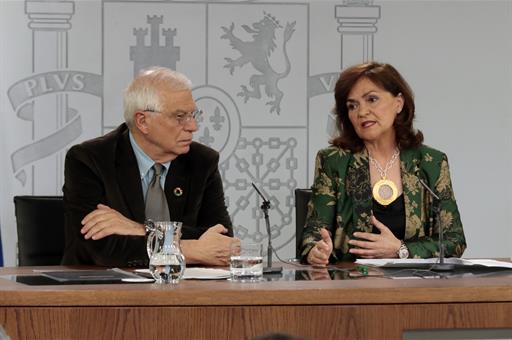Council of Ministers
Government approves measures to foster equality at work
Council of Ministers - 2019.3.1
Moncloa Palace, Madrid
The Council of Ministers approved the Royal Decree-Law on urgent measures to guarantee equal treatment and opportunities at work, which will be submitted to Parliament for its ratification.
The Vice-President of the Government, Minister for the Presidency, Parliamentary Relations and Equality, Carmen Calvo, considered that this new legislation will improve work/home reconciliation, eliminate salary discrimination, reduce the pension gap between men and women and make equality plans in companies more widespread.
The Royal Decree-Law extends leave following the birth of a child, and care for children to progressively bring conditions for both parents into line. The progenitor other than the biological mother will have leave extended to 16 weeks. Carmen Calvo specified that the term for the implementation of this measure will be three years "to allow sufficient time for companies to adapt". Accordingly, this leave will stand at eight weeks in 2019, 12 weeks in 2020 and reach 16 weeks in 2021.
As regards the wage gap between men and women, Carmen Calvo explained that, at present, this stands at around 23% in some work areas and that "many women are not even aware that wage discrimination may exist". Accordingly, and in compliance with EU legislation, it is established that companies with more than 50 workers must keep a register of their salary tables, which male and female workers may access through their trade union representative or their staff delegate.
Companies with more than 50 workers must also draw up and apply an equality plan, which means extending the obligation contained in the Constitutional Law on effective equality between men and women, which has only affected those companies with more than 200 workers until now.
In addition, the new legislation includes recovering the financing of social security contributions under the special convention for non-professional carers of those people in a situation of long-term care charged to Central Government. Accordingly, the contributions for workers, principally women, that leave their work to care for other people will not be interrupted, which leads to a lower pension, specifically "between 300 and 370 euros less", reported the minister.
Royal Decree-Law on urgent housing measures
The government approved the Royal Decree-Law on housing, with measures designed to incentivise property rentals, offer greater certainty and security for tenants and provide support for the most vulnerable groups.
Carmen Calvo explained that the text includes the key content of the Royal Decree-Law approved back in December, which was not ratified by the Lower House, and incorporates new features "that strengthen a far-reaching social intent on the right to housing and its social use".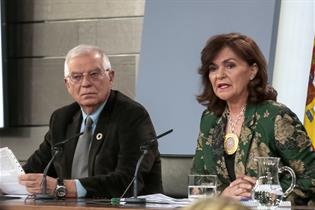 Pool Moncloa/JM Cuadrado
Pool Moncloa/JM Cuadrado
Among these, it provides for the creation, within a term of eight months, of a State reference index on the price of property rents, which will be tied into the rise in the CPI, and which stipulates that contracts not registered in the Property Register will have effects on third-party relations such that when a rental property is sold, the tenant is protected.
Some of the previous measures remain, such as the increase in the minimum legal term in which the tenant may remain in the rental property from three to five years, the modification of the regulation on Property Tax to foster the rental market, and that a majority of three-fifths of owners may limit the use of properties in the residential area for tourist purposes.
As regards eviction procedures, Carmen Calvo stressed that the text continues to reflect the government's concern at providing a response to those affected. "The obligation will exist to notify these circumstances to social services, so that no-one finds themselves in extreme situations of insecurity", she claimed.
Rights of Spanish and British citizens in the event of Brexit without an agreement
The Council of Ministers approved the Royal Decree-Law adopting contingency measures in the event of the potential withdrawal of the United Kingdom from the European Union without the agreement provided for in Article 50 of the Treaty on European Union. This law would only come into force in the event of a withdrawal without an agreement.
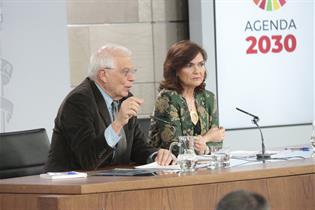 Pool Moncloa/JM CuadradoThe aim of the measures is to guarantee the rights of Spanish citizens and of the 300,000 British citizens resident in Spain, their legal certainty and their protection on matters of social security and healthcare.
Pool Moncloa/JM CuadradoThe aim of the measures is to guarantee the rights of Spanish citizens and of the 300,000 British citizens resident in Spain, their legal certainty and their protection on matters of social security and healthcare.
The Minister for Foreign Affairs, European Union and Cooperation, Josep Borrell, recalled that the British Parliament will vote in the coming days on whether to accept the Withdrawal Treaty, whether it leaves the EU without an agreement and whether it applies for an extension to allow time to reach a decision.
Josep Borrell specified that in the event that the United Kingdom decides to leave without an agreement, Spain will apply the legislation approved on Friday. The Royal Decree-Law, he said, will mobilise human, regulatory and material resources. It provides for actions of a logistical nature, such as new hirings, in order to preserve the interests of Spanish and British citizens that "exercise their right to free movement before the withdrawal date" and "preserve the normal development of trade flows and Spain's economic interests".
These measures stressed the minister, "are of a unilateral nature", although they are conditional on the United Kingdom guaranteeing the reciprocal treatment of Spaniards resident in their country and in Gibraltar.
From among these initiatives, Josep Borrell particularly highlighted those that affect Spanish interests in Campo de Gibraltar and the 9,000 cross-border workers that cross over into Gibraltar every day.
The minister also stated that the legislation regulates the exercise of professional activities and access to public employment. As regards healthcare, Josep Borrell disclosed that the conditions are "extremely generous so that there is no breakdown of the current situation".
Furthermore, access to Spanish universities for students from the education systems in the United Kingdom and Gibraltar are regulated, together with economic activities, financial services, land transport and customs, among others.
Africa Plan
The government approved the 3rd Africa Plan, which seeks to convert this continent into one of the priorities of Spanish foreign policy.
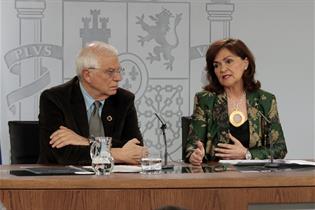 Pool Moncloa/JM CuadradoThe Minister for Foreign Affairs explained that this is a long-term strategic document that seeks to harness the opportunities that Africa represents for Spain and contains the country's contribution to the development of the continent from the perspective of sustainability, gender equality, institutional structures, mobility and growth.
Pool Moncloa/JM CuadradoThe Minister for Foreign Affairs explained that this is a long-term strategic document that seeks to harness the opportunities that Africa represents for Spain and contains the country's contribution to the development of the continent from the perspective of sustainability, gender equality, institutional structures, mobility and growth.
Josep Borrell argued that Africa is a great source of opportunities, since it is a dynamic continent, which has increased its economic capacity and its stability. He also stated that the government must work so that Spanish companies and society are present in the region.
The minister specified that the plan will focus on those countries with the greatest potential for growth, and the most stable, which attract immigration from their neighbouring countries, such as Nigeria, South Africa, Ethiopia, Angola and Senegal. The document focuses on four main areas: peace and security; sustainable development for inclusive economic growth; strengthening institutions; and orderly, regular and safe mobility.
For her part, the Vice-President of the Government, Carmen Calvo, declared that for the government it is very important to look towards Africa and cooperate. "We are the closest European country to Africa, it is important for us and we have resumed the political pulse in relation to Africa that had been lost".
Research personnel
The Council of Ministers approved the Statute on Research Personnel in Training (Spanish acronym: EPIF), which regulates the work conditions of pre-doctorate researchers.
The Vice-President of the Government, Carmen Calvo, recalled that the entry into force of the Statute is provided for in the Science, Technology and Innovation Act 2011 and hence, "it is a long-awaited measure" by researchers, "particularly young researchers".
The Statute defines the conditions of pre-doctorate research personnel in training, which will conclude with attaining the official university qualification of a PhD. A specific form of contract is established with a minimum duration of one year and a maximum of four, and a minimum wage that is higher than that which they currently receive.
Other agreements
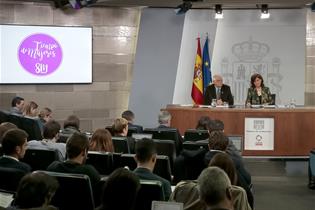 Pool Moncloa/JM CuadradoThe Council of Ministers approved the creation of the Macro-prudential Authority Council for Financial Stability (Spanish acronym: AMCESFI), a body attached to the Ministry of Economy and Business, which will be responsible for preventing and mitigating systemic risk for financial stability. The new legislation establishes its structure, legal system, functions and powers. Carmen Calvo claimed that this body will introduce "rational elements on prevention, coordination, functions and responses", which will mean that situations that lead "to a crisis such as the one we have been through" can be avoided.
Pool Moncloa/JM CuadradoThe Council of Ministers approved the creation of the Macro-prudential Authority Council for Financial Stability (Spanish acronym: AMCESFI), a body attached to the Ministry of Economy and Business, which will be responsible for preventing and mitigating systemic risk for financial stability. The new legislation establishes its structure, legal system, functions and powers. Carmen Calvo claimed that this body will introduce "rational elements on prevention, coordination, functions and responses", which will mean that situations that lead "to a crisis such as the one we have been through" can be avoided.
On another note, the government agreed on a declaration on the occasion of International Women's Day, which expresses its firm commitment to equality between men and women and to the fight against gender-based violence.
The government also approved the regulation and commitment of the Observatory on Women's Health (Spanish acronym: OSM) in line with its commitment to equality between men and women.
The government also updated the National List of Professional Qualifications in the fields of Textile, Clothing and Leather, Machine Manufacturing, Hotel and Catering and Tourism, and Image and Sound.
This is not "a caretaker government"
During her appearance at the press briefing subsequent to the Council of Ministers, the Vice-President of the Government stated that the President of the Government, Pedro Sánchez, will sign a Royal Decree on Monday calling general elections to be held on 28 April to be presented to King Felipe VI for his ratification. On Tuesday, 5 March, this will be published in the Official Journal of Spain.
Carmen Calvo pointed out that this is "not a caretaker government", since it will continue to adopt measures such as the Royal Decree-Laws adopted on Friday, with the limitations established by the Constitutional Law on the General Electoral Regime during election periods.
The Vice-President of the Government argued that, over the last nine months, the government has converted politics "into a space for decision-making, transformation and response" to the problems of citizens, who had suffered a deterioration in their quality of life and in certain rights and social benefits.
Non official translation





